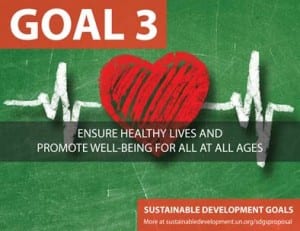We’re almost there.
This year, tobacco control was included in several key United Nations (UN) documents that will change our future. We know that mentioning tobacco control and tobacco control treaties in UN documents seems only natural, but in the last set of Millennium Development Goals (MDGs), tobacco control and non-communicable diseases (NCDs) were left out.
Mentioning tobacco as a risk factor for development challenges and measuring progress in reducing its use is important because tobacco use is the only risk factor common to the four major NCDs: heart disease, lung disease, cancer, and diabetes.
No country is immune to these diseases, which is why we must take serious action.
Leaving tobacco out of the MDGs in 2000 had global repercussions such as limited whole-of-government engagement in tobacco control and insufficient resources for tobacco control, both of which caused a lag in implementation of the Framework Convention on Tobacco Control (FCTC).
And, since the establishment of the MDGs, the burden of NCDs has grown significantly in low- and middle-income countries. 
The new Sustainable Development Goals (SDGs) will be decided upon in September 2015, after the MDGs expire. The SDGs will set the development agenda for low-, middle-, and high-income countries for the next 15 years. We must ensure that tobacco control and NCDs are at the forefront of the post-2015 development agenda and that health is a priority, so that adequate resources are allocated at the country level.
This year, ASH has been tirelessly advocating for the inclusion of the tobacco treaty (the FCTC) within the global NCD framework and the post-2015 development agenda. The UN NCD Review took place in July of this year. At that time, we welcomed the inclusion of the continued commitment to the accelerated implementation of the FCTC in the outcome document. The Open Working Group (OWG) on Sustainable Development also completed its work in July and published a proposal for the SDGs. This included the FCTC as a means of achieving the implementation target under the health goal. It states:
“3a. strengthen implementation of the Framework Convention on Tobacco Control in all countries as appropriate”
We gladly welcome the inclusion of the FCTC; however we must work hard over the next few months to ensure that this proposed language remains in the final text. This advocacy work requires a joint effort among all tobacco control and NCD advocates.
In October, tobacco control advocates and government officials met in Moscow, Russia for the FCTC Conference of the Parties. The post-2015 development agenda was a key topic of discussion and was included in a decision on NCDs. It states:
“Requests the Secretariat to: promote the WHO FCTC, wherever possible, in ongoing discussions on the post-2015 development agenda.”
We urge the Secretariat of the COP to highlight the importance of the FCTC within the post-2015 agenda over the next few months.
Although we have seen successes this year, there is much left to do before the post-2015 development agenda is finalized. We must continue to advocate for the inclusion of the FCTC in the SDGs.
If you are interested in getting involved, please contact Shana Narula, Campaign Coordinator, narulas@ash.org. For more information on this campaign, click here.
Please consider supporting ASH’s work on the post-2015 development agenda by clicking here.